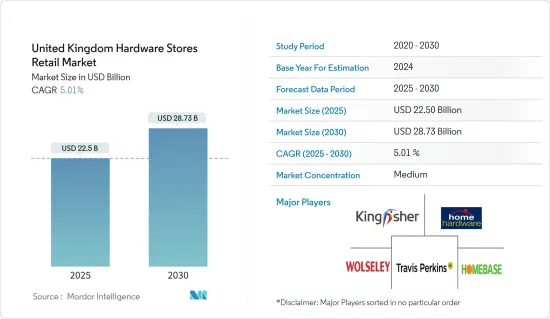PUBLISHER: Mordor Intelligence | PRODUCT CODE: 1645073

PUBLISHER: Mordor Intelligence | PRODUCT CODE: 1645073
United Kingdom Hardware Stores Retail - Market Share Analysis, Industry Trends & Statistics, Growth Forecasts (2025 - 2030)
The United Kingdom Hardware Stores Retail Market size is estimated at USD 22.50 billion in 2025, and is expected to reach USD 28.73 billion by 2030, at a CAGR of 5.01% during the forecast period (2025-2030).

The hardware store market in the United Kingdom is an essential part of the retail sector, meeting the varied requirements of businesses and consumers engaged in construction, home improvement, and DIY projects. Hardware stores in the United Kingdom typically offer a range of products, including tools, building materials, plumbing supplies, electrical components, paint, gardening tools, and home improvement products. The market is competitive, with various national and local players.
Several factors drive the retail market for hardware stores in the United Kingdom. With more people spending time at home, there has been a notable increase in DIY and home improvement projects, leading to a higher demand for hardware products. The construction industry's performance, including residential and commercial construction, also significantly influences the demand for hardware products. Additionally, innovation in hardware products, such as smart home devices and eco-friendly materials, can drive consumer interest and contribute to market growth.
United Kingdom Hardware Stores Retail Market Trends
The Growing Emphasis on DIY Projects is Boosting the Demand for the Hardware Retail Market
The DIY home improvement retailing market is gaining immense popularity among individuals due to its cost-saving benefits by eliminating labor costs. This trend allows individuals to allocate more of their budget towards purchasing high-quality materials and tools, ensuring long-lasting results. Increased focus on DIY projects is expected to significantly impact hardware stores in the United Kingdom. With more people engaging in DIY activities, there is likely to be a surge in demand for tools, materials, and supplies, which could prove advantageous for hardware stores.
This trend might also intensify competition among hardware stores, compelling them to adapt their offerings and services to the evolving needs of DIY enthusiasts. Moreover, the proliferation of online shopping and e-commerce platforms could further affect traditional brick-and-mortar hardware stores, as consumers may opt for online purchases of DIY supplies over in-store shopping. In light of these developments, hardware stores in the United Kingdom may need to carefully evaluate their strategies and offerings to respond effectively to the growing emphasis on DIY projects.
Growing Trend of Home Improvement and Renovation Projects
There is a growing trend of home improvement and renovation projects, with more people investing in upgrading and enhancing their homes. It can be attributed to several factors, including the desire to increase property value, improve living spaces for personal enjoyment, and adapt homes to changing lifestyle needs. Additionally, online resources and tutorials have made DIY projects more accessible and appealing to homeowners. COVID-19 has also contributed, as many individuals have spent more time at home and sought to make their living spaces more comfortable and functional. Overall, the trend of home improvement and renovation projects is expected to continue as homeowners prioritize creating personalized and comfortable living environments.
United Kingdom Hardware Stores Retail Industry Overview
The hardware stores retail market is moderately fragmented with many players. Numerous smaller players operate independently or as part of smaller chains rather than a few dominant companies controlling the market share. Screwfix had implemented strategies to maintain a seamless customer experience across all touchpoints, from online browsing to in-store checkout and order pickup. The key players include Kingfisher PLC, Home Hardware (Scotland) Ltd, Travis Perkins PLC, Homebase, and Wolseley UK.
Additional Benefits:
- The market estimate (ME) sheet in Excel format
- 3 months of analyst support
TABLE OF CONTENTS
1 INTRODUCTION
- 1.1 Study Assumptions and Market Definition
- 1.2 Scope of the Study
2 RESEARCH METHODOLOGY
3 EXECUTIVE SUMMARY
4 MARKET DYNAMICS AND INSIGHTS
- 4.1 Market Overview
- 4.2 Market Drivers
- 4.2.1 Increased Focus on DIY
- 4.2.2 Growing Trend of Home Improvement and Renovation Projects
- 4.3 Market Restraints
- 4.3.1 High Competition Impact the Profitability of Hardware Retail Stores
- 4.3.2 Supply Chain Disruptions
- 4.4 Market Opportunities
- 4.4.1 Introducing New and Innovative Products Rise the Demand for Hardware Stores
- 4.5 Value Chain Analysis
- 4.6 Industry Attractiveness: Porter's Five Forces Analysis
- 4.6.1 Threat of New Entrants
- 4.6.2 Bargaining Power of Buyers
- 4.6.3 Bargaining Power of Suppliers
- 4.6.4 Threat of Substitute Products and Services
- 4.6.5 Intensity of Competitive Rivalry
- 4.7 Insights into Technological Advancements in the Industry
- 4.8 Assessment of the Impact of COVID-19 on the Market
5 MARKET SEGMENTATION
- 5.1 By Product Type
- 5.1.1 Door Hardware
- 5.1.2 Building Materials
- 5.1.3 Kitchen and Toilet Product
- 5.1.4 Other Product Types
- 5.2 By Distribution Channel
- 5.2.1 Offline Stores
- 5.2.2 Online Stores
6 COMPETITIVE LANDSCAPE
- 6.1 Market Concentration Overview
- 6.2 Company Profiles
- 6.3 Kingfisher PLC
- 6.4 Home Hardware (Scotland) Ltd
- 6.5 Travis Perkins PLC
- 6.6 Homebase
- 6.7 Wolseley UK
- 6.8 Ferguson PLC
- 6.9 The Range
- 6.10 Hampstead Hardware
- 6.11 Malletts Home Hardware
- 6.12 Stax Trade Centres Limited
7 FUTURE MARKET TRENDS
8 DISCLAIMER AND ABOUT US




